Freedom From Fear
Change some time made shock. If we not ready, change will made we go down.
When I was begn as a Journalist at 1986, we normally life received unclear information. At press, when published at the time, especially about politics and power very minimum publishing. At was the time, “Java King” Suharto in power. Since he was in power, when I was just birth from my mom, Suharto begin banned some media who not support his power, military or his political machine, Golkar.
Press at was the time, more wrote behind the line, and tend to be wrote behing the lies. Many events, facts or scandal not blow up at media (unpublished). Labour strike, students demonstration or farmers protest, who his land occupied without justice, not published in mass media. Some time media who publishing must stop (banned), if power unlike with that news.
At 1994, media when I worked, Tempo Weekly Magazine closed by government. Because publishing scandal president, minister of Technology, military officer, bussinessme who close with Suharto for buying 39 ex East Germany warships for German.
Pressure to media, especially journalists at the moment come from every where. From power, military who threat journalists, and streetman or mafia groups who pay by some one. One Journalists association at was the time, PWI, also pressure mass media company and journalists. About, publishing license, media company to be a victim black mail. And “idealis” journalist on exiled and restricted his action.
Because pressure come from every where, our country ever some body call “Republic of Fear”, every boby fear to talk, press also fear. Every body who protest or anti government imprisoned, killed or dissappeared. And me one of journalist in jail for three years (1995-1997), because, “showing hatred againts government.” May be I’m still lucky, because any journalist who killed, or missing untill now.
Indonesian Sociologist Arief Budiman, described about the fear.
Our press does indeed live in fear : fear of the government and fear of the public’s views. The first impedes growth of democracy while th second has the opposite effect.
This fear of the government is caused by the fact that our press has changed from being a “fighting press” into a “Business-oriented press”. At present our press puts the priority on selling information in the market rather than on disseminating information tha is true (but raises the isk of conflict with the powers that be) or sides with the weak. We could indeed feet very grateful if we had a media that, although it placed its priority on business, sill managed to pay attention to “the struggle.”
This situation is made worse by the fact that democracy in this country is still very weak. The government remains strong while the societal institutions (political parties, mass organiozations and also the press) bear little significance.
Thus, press publication that would have preverred to fight, have to think twie before pursuing their mission. As aconsequence, the bigger they grow (in the sese of business success achieved) the more careful (read : afraid) they become in confronting the power of government. Unfortunately, capitalism has made its inroads everywhere, including among the press.
The fear of the public’s view is caused by the fact that the banning of media publications is usually based on principles of power rather than justice. Muzzling of pornographic media publication usually cause little fuss among the public. What does raise much furor are political muzzlings that are based on protecting the interests of the powers that be. Therefore, even thought they are in support of the government, press publication that support the bans have difficulties in expressing their views openly. Thus, it is not surprising that obervers outside the media are in support and which ones oppose the government’s action. The reason, again, because our press lives in fear.
Untill now, the fear no more lost, even though, Suharto, not in power any more. For example, our humanrights activis, Munir, killed by arsenic (poison) when in flight (with government flag airlines) to Nederland for study in Law. Untill now, our government not seriously to find the killers, because, military intelegent involved.
The last, Suharto, now not in power any more, because students pressure, people, press and also economic crissis. But, the problems still fac on face. Corruptions still worse. And crimes agains humanity never responsible at the court. And Suharto never told appologize to people, and his money from corrupt when in power, untouchable. Because after Suharto step a side, his change his patronages.
Fortunately for media company, because now not license publication any more. It’s mead government not involved his hand directly to pressure or banned the media. Pressure come undirectly, for example streetman come to media office to made teror. But on “free” time, also still have, journalists killed because his wrote. Much, in the region, out side capital.
Treasure of Suharto era, all nine TV stations, who have license, befor Suharto step a side, that’s all from his families, closed friend or patronages. Not, independent TV station. Radio and print media, where still independent, also not more, you cant count with your fingers.
Journalists and idealist people only victim of change.
Why journalists or media should to role the development?
Former World Bank President, James D. Wolfensohn, wrote "More than 1.2 billion inhabitants of this world live on less than one dollar a day. And many ofthese poor do not just suffer from a lack of food and clothing, but also have no voice in making thedecisions that concern their lives. Add to this the corruption and weak governance that erode the effectiveness of the assistance of other countries. There has certainly been progress in this area, but development is a complex issue that covers various activities in various areas. A major prerequisite in developing an effective development strategy is the transmission of knowledge and
empowered transparency. To reduce poverty, we must free up access to information and improve the quality of that information. People who have better information are more able to make better choices.
For these reasons I have long had the opinion that press freedom is not a luxury. This is the essence of just development. The media can expose corruption. The press supervises public policy through highlighting government policy. The media enables many people to give voice to their diverse opinions on governance and reformation, and helps to create a consensus for bringing about change. A press such as this assists the performance of the market to become healthier, from small-scale trading in vegetables in Indonesia through to global trading in foreign exchange and the capital markets of London and New York. The press can facilitate trade, and channel ideas and innovations across national boundaries. We have also seen that the media plays an important role in human development, in disseminating information on education and health to isolated villages from Uganda to Nicaragua.
Criminalization of Journalists
It is the acknowledgement of the importance of press freedoms for the benefit of the nation that hascaused the widespread tendency for the decriminalization of legal penalties for freedom of opinion, expression, and press freedom. The United States has already practiced this since 1964 (through a decision of the US Supreme Court in the case of "the New York Times vs. Sullivan), whereas European
countries were initially diverse, but since the formation of the European Human Rights Court, inpractical terms, the criminalization of press articles no longer applies in European Union countries. In Japan the decriminalization of press articles has been in effect for decades and, according to Professor Masao Horibe, senior lecturer in the Law Faculty at Chuo University in Tokyo, the largest claim ever awarded by the Supreme Court in Japan against the press was only valued at
five million yen (around Rp 550 million.) See "Law Colloquium 2004: From Insult to Slanders,Defamation and the Freedom of the Press", published by the Literacy Foundation)
The tendency to decriminalize journalistic works and to limit to the value of civil claims has not only occurred in advanced countries. Ghana and Ukraine did this in 2001 and Sri Lanka in 2002. Even Timor Leste, which still uses the Indonesian law produced until 1999, through UNTAET decree no 2/2000 has withdrawn all articles containing criminal penalties affecting the freedom of opinion,expression, and press freedom.
Possibly we are naive, but we honestly feel that we can play a role in helping to overcome this nation's nervousness about practicing democracy. As journalists, whose task from day to day is to convey information to the public, we feel challenged to play a participatory role in supplying the public with information that is relevant, credible and timely.
We believe the public's capacity to make decisions and the quality of those decisions is dependent on the information that they obtain
before these decisions are taken. If the people cannot get the necessary information, it is likely their decisions will not be the right ones. If mistakes in taking decisions often occur, then the self-confidence of the man in the street concerning his capacity to play a participatory role in the democratic process will continue to slide so it is not impossible that this might at one point completely vanish. If that happens, the democratic fatigue syndrome will then surface.
The longing for a strong and authoritarian governance would then grow among the simple folk slumped in hopelessness, and this nation would then be again trapped in the grip of another authoritarian regime that, if we refer to history, would end up in national decline. This happened to the German nation ahead of its election of Hitler as the top leader of that country. It also happened in Italy and led to the dictator Mussolini assuming control and developing a fascist governance. We all know that these two leaders took their nations to the brink of extinction. We of course do not want that to happen to the Indonesia nation also in our region, Asia.
Jakarta, 20 Oct, 2006
Ahmad Taufik
Journalist, paper for Gwangju Forum
“Democratization Movement in Asian Region and Mass Media".
Sources :
1. (Banning 1994, Alliance of Independent Journalists).
2. The Right To Tell: The Role of Mass Media in Economic Development
3. Defense at the Court of BHM
Tiket Bis
10 tahun yang lalu







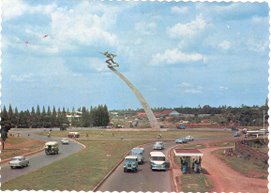
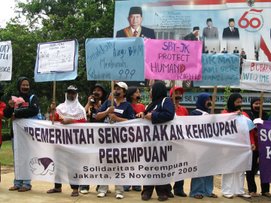
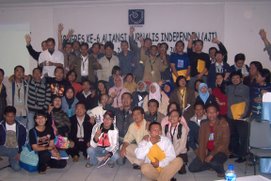


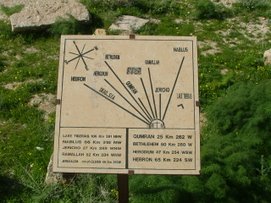

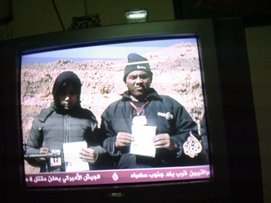

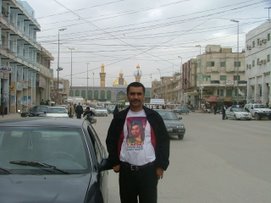
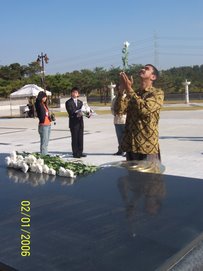
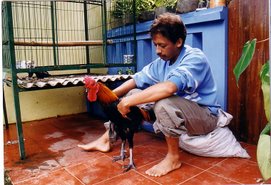
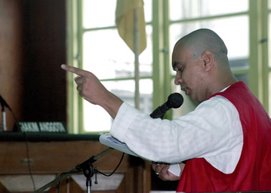
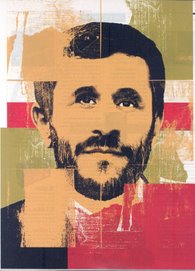
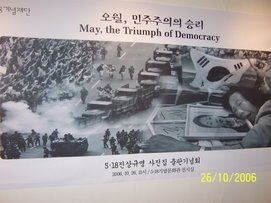
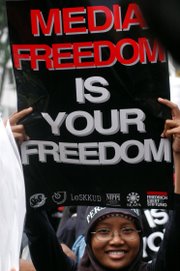
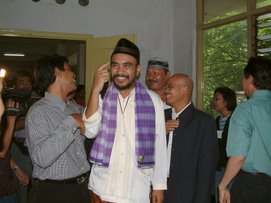



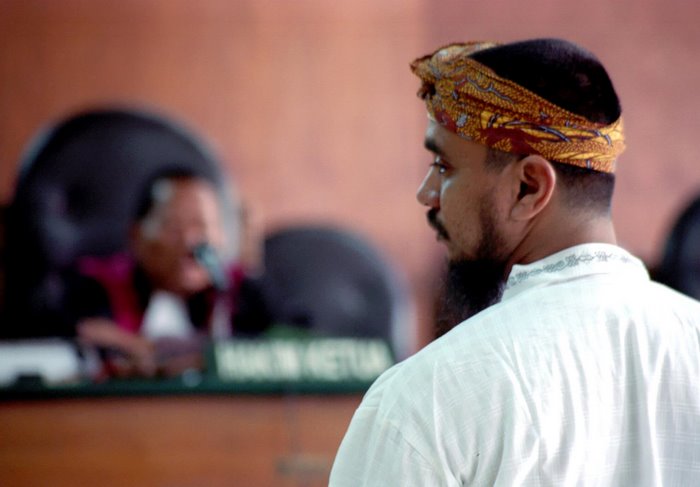

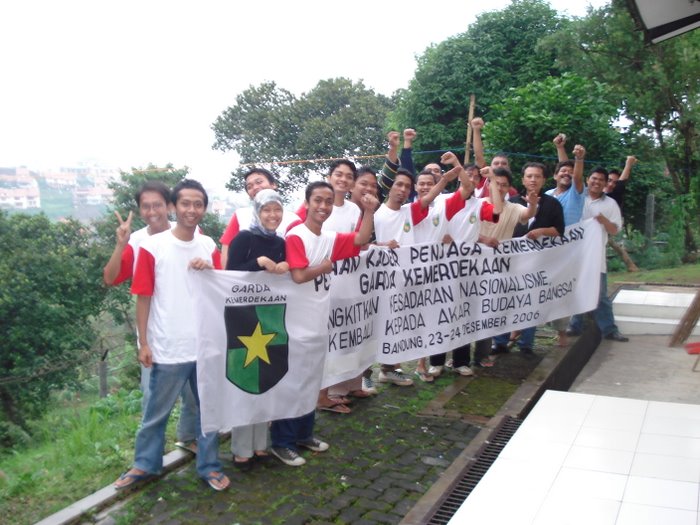
Tidak ada komentar:
Posting Komentar